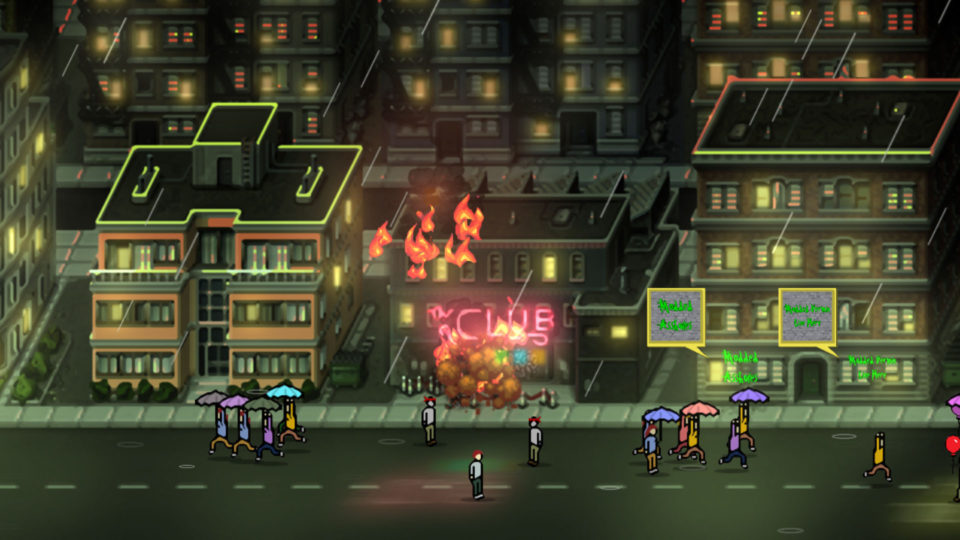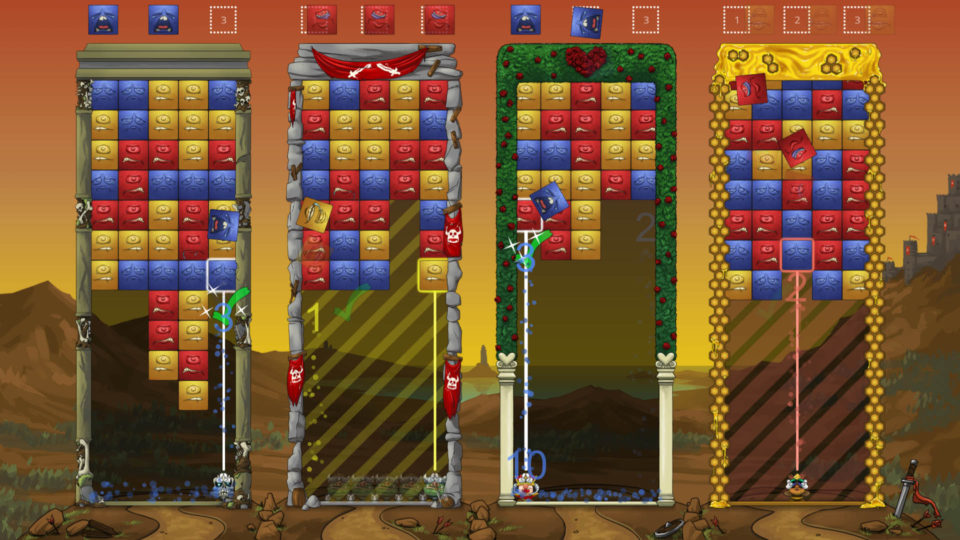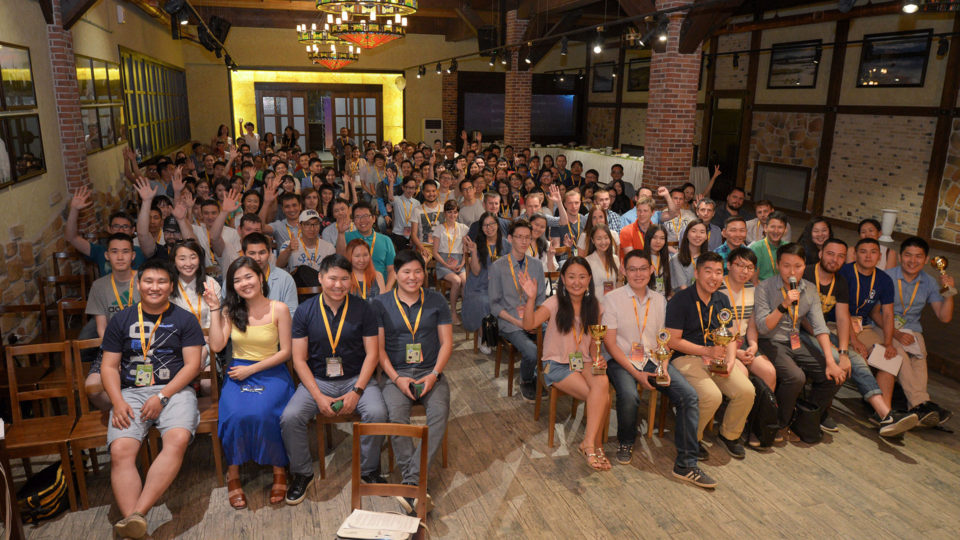A good mentor can make someone’s career, while a bad one will break it. Learn how to become one of the “makers” and not “breakers” at the Mentorship Summit that the IGDA Foundation brings to Casual Connect USA 2018 on January 17, 2018.
main
EventsNews
Learn to Leverage Diversity for Gaming at Casual Connect USA 2018
With diversity as a business approach slowly becoming the new normal in the tech industry and games in particular (not without difficulties, of course!), bigger companies and organizations already have lessons to share with others aiming on implementing the same principles in their work – be it gamedev or any other tech-focused business. Want to know how to implement, leverage and support this principle in what you do? The Diversity & Social Responsibility track at Casual Connect USA 2018 is at your service on January 17 in the South Ballroom of the Disneyland® Hotel.
DevelopmentExclusive InterviewsGame DevelopmentIndie
HEADLINER: What if YOU controlled the news?
If something’s bothering people’s mind, it’s just a matter of time till there’s a game about it. Fake news have been trending for a while, and resulted, among other things, in HEADLINER: a short adventure game about media bias and how it affects the society, families and careers. The Seattle-based developer Unbound Creations has worked with teams up to 6 people on their previous titles, but HEADLINER has mostly been just Jakub Kasztalski.
However, as prototyping went on and Jakub observed what was happening around the world, the design shifted towards the narrative and media bias. “Here’s an article I wrote that goes into more details of how I mined Facebook and Google data to stay relevant to today’s issues”, he shares.
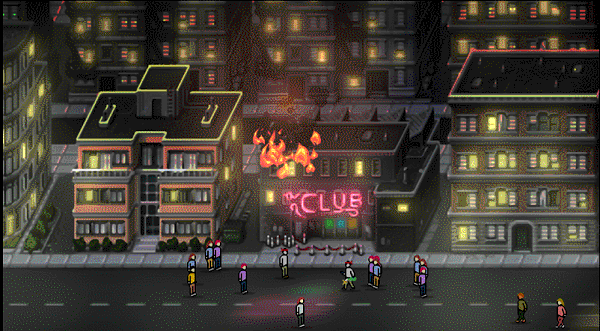
Try Before You Decide
“I started with free/public domain 3rd party assets and simple scenes built in Blender to nail down the look/feel/setting”, the developer recalls. “I went through 2-3 iterations before arriving at the final look. Overall, that wasted a lot of time, but not being an artist myself, it helped me figure out what “felt right” and what I wanted to really communicate. I’m very “try before you decide” when it comes to visuals”.
“I settled on Vector Art as I realized it’s the one style I could actually do myself. I researched a lot of references, the biggest being the awesome Lyft commercial.”

The street scene remained a 3rd party pixel artwork, but Jakub had upscaled it and did a lot of post-processing. He also used the baseline sprites to create new variations, such as police or rioters.
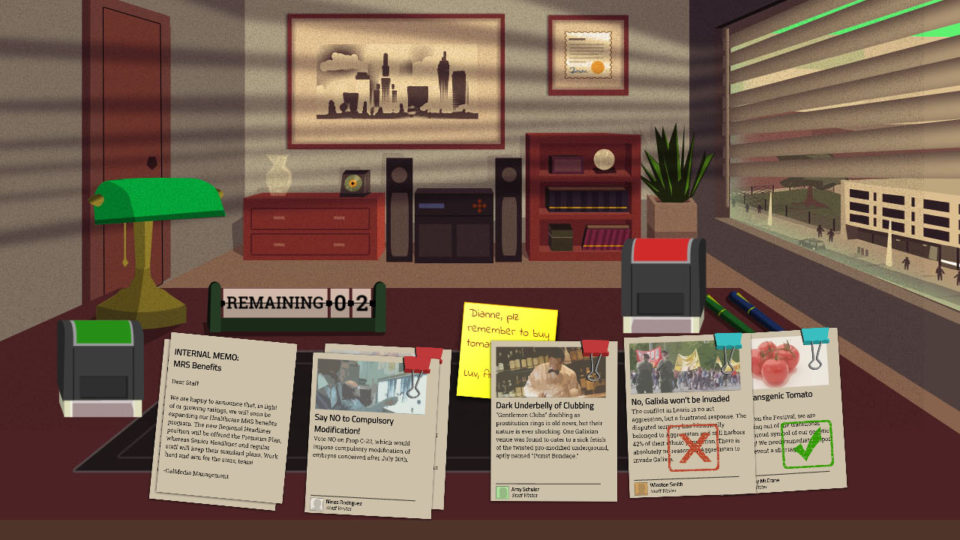
Music was also public domain/creative commons, but again the developer spent a lot of time researching: “I’d just play different tracks in the background while coding and testing, until I found ones that felt right”.
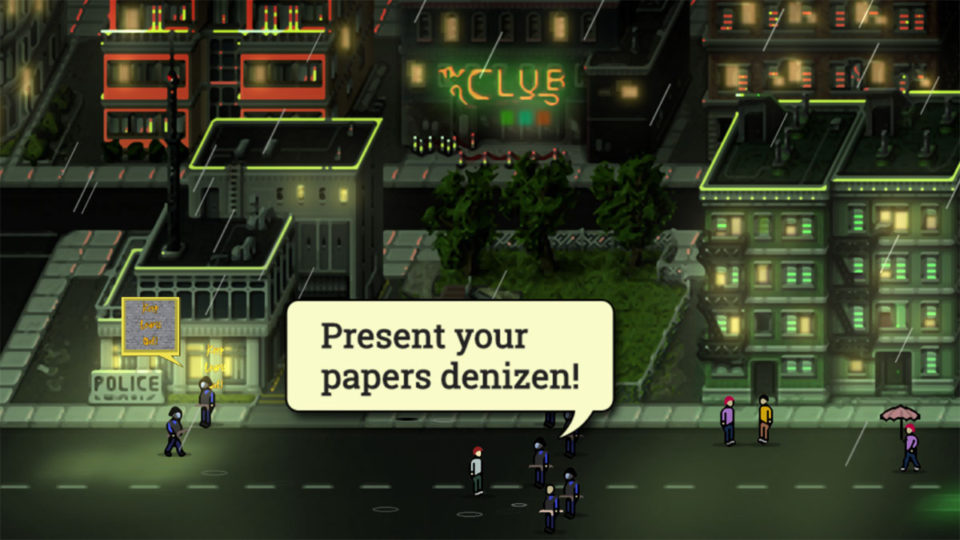
Someone Might Get Offended
When asked how not to offend anyone with a game on a touchy subject, Jakub confesses: “Honestly, I just follow my gut feeling. I’ll admit I used to be really socially awkward when I was younger (as many geeks are), but through great friends and few years of freelancing I learned where the social boundaries lie. I just apply the same skills to my work instinctively I suppose”.
“I also listen to the feedback I get. For example, many testers asked me why your spouse was always of opposite gender - why you couldn’t have same-sex marriages in the game? And I realized there really isn’t a good reason not to, so I added that”.
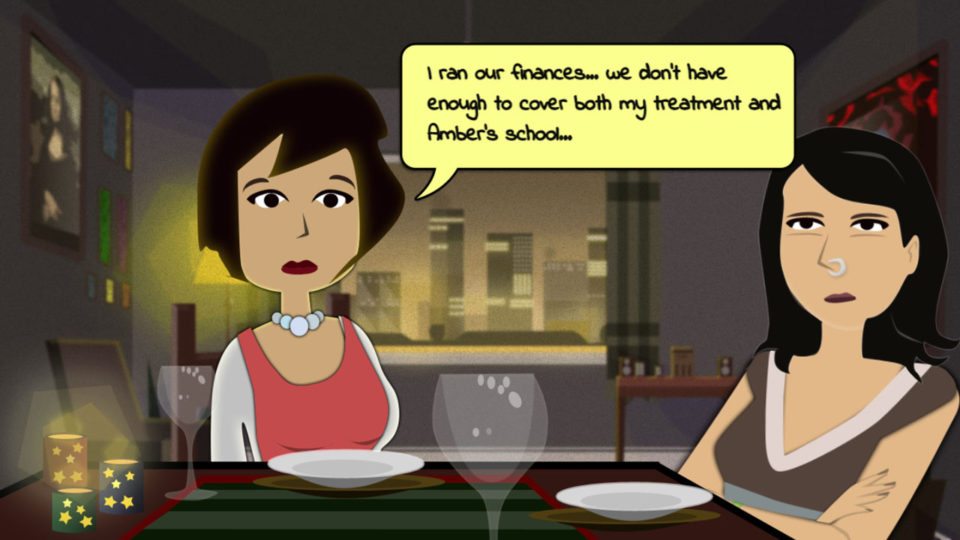
“There are some ideas I am trying to communicate in the game so it is inevitable that someone might get offended. And honestly if they do - well, that’s just what I stand for I guess. You can’t please everyone”.
Learn From Others'(and His Own) Mistakes
Learning from others’ experiences is what Jakub fully uses in his dev practice. Being inspired by titles like Papers, Please and Westport Independent, he read through Steam and press reviews. “I really tried to find what worked and what didn’t, building on the formula instead of simply copying”, he explains. “For example, in Papers, at the end of the day you might get a white text on black screen telling you your wife died. Well, that’s not very engaging. That’s why I wanted the whole street and home section - show, don’t tell. Make the player care about the world he’s building (or destroying).
“There are many pitfalls I’ve learned and still need to learn. Brevity is very important I realized, as most gamers don’t want to be reading a book while playing (purely text-games and interactive fiction aside). Secondly, players want to really feel the impact of their actions, even if it may feel like over-explaining at times (I tend to be overly subtle). Lastly, fleshing out the world may seem wasteful, but it can do a lot for immersion - all my games have been praised for creating a believable sense of space (even if you only see a fraction of all the research and backstory I wrote)”. Jakub hints there’s a ton more lessons he could come up with, “but that’s probably a whole different topic in an of itself”
Looking back, Jakub says he’s pretty happy with how things went. “All the significant improvements I would have liked to add at this point would have taken several months and considerable investment. However, for various reasons, I did not want to go down that route, instead preferring to spread the additional effort and lessons learned over future episodes and new games”. If he still had to pick one area to improve, it would be artwork: “it was a big learning experience for me and I think it shows”.
Meanwhile, a fresh wave of fake news is coming up. “I’ve got a few ideas brewing in my head right now, but two of the major changes would be a bit randomized newspaper system for more engaging replays, and more personal interactions with various characters you meet”, Jakub shares. You can also join the world domination through news planning through the game’s official Discord, and keep track of updates on Twitter.
EventsNews
Casual Connect Kyiv United In Diversity Track: Diversity Experience Exchange
“Diversity” and “Ukraine” were actively mentioned in one sentence around the time of Eurovision 2017, where “Celebrate Diversity” was the official slogan of the show. While it brought some attention to diversity-related issues in the country, it’s still up to particular companies how to implement diversity-friendly policies and adapt them to local reality. While being part of global processes and tagging along with adopting best practices from other countries, Ukraine has it’s own array of diversity-related issues, with the status of women in managing positions, work-parenting balance, as well as major accessibility problems being the main ones. Fortunately, things are moving forward – come to the United In Diversity track at Casual Connect Kyiv, and learn from the best Ukrainian diversity-enforcing experiences.
DevelopmentExclusive InterviewsGame DevelopmentIndie
Tumblestone: The Casual Competitive Anomaly
They call themselves The Quantum Astrophysicists Guild, and they’re four guys based out of Seattle. “I started the company years ago, during the development of my previous game, The Bridge, says the company’s founder Ty Taylor. “I met the artist of The Bridge, Mario Castaneda, in university, and we’ve been working together since (he made the art for Tumblestone as well). For Tumblestone, I brought on two engineers, Alex and Justin, who I met while working at Microsoft”. Working on the current projects, the team doesn’t abandon their previous creations: The Bridge is getting released for Nintendo Switch, while Tumblestone is becoming a competitive game.
DevelopmentExclusive InterviewsGame DevelopmentIndie
#CoronaDefoldJam: Cooperation in Competition
“There’s a long story of just talking about industry things in a very casual manner with no real common action points. But then it just happened: both Defold and Corona were into doing an online game jam”, says King’s Evangelist Oleg Pridiuk. This competition started at the same time as Ludum Dare, but is still ongoing till October 1st (and yes you can apply!) - and is of those rare cases when middleware companies targeting the same audience decide to join efforts for good.
The programming language of Lua happened to be the unifying force for the two engines. “It’s all about exposure. We loved the idea of this gamejam because Lua is a great language that needs more exposure, and for Corona Labs, not enough people understand how awesome our instant-update simulator and live builds are for quick development iteration,” explains Julie Shmyrova, the Marketing Director for Appodeal (that acquired Corona earlier this year). The two engines representatives share some insights on how to make the most out of their respective software in the time- and resources-restricted reality of a gamejam.
Asia 2017Video Coverage
Diana Platonova: Bringing a Hidden Object Game to Top 20 | Casual Connect Video
Diana Platonova is the Business Development Manager at MyTona, an international free-to-play games developer and publisher, where her main goals are increasing MyTona’s business growth and widening its branding. In her Casual Connect Asia talk Diana shared tips and tricks of bringing a Hidden Object game to Top 20 Grossing, with the example of MyTona’s title Seekers Notes: Hidden Mystery that climbed the chart up to Top 20 Grossing for US iPad. One of here tips was: “We target offers by special filters, so that each player gets what’s most suitable for them.”
AudioDevelopmentExclusive InterviewsGame Development
Get Even: Immersive Experience with No Special Hardware
A hero named Black, an ice-cold mercenary and hired gun, wakes up to discover he has lost memory. Under the guidance of his anonymous captor, ‘Red’, Black embarks on a form of treatment, facilitated by a unique technology - a headset that allows the user to relive their memories and experience them again in the present. This is how the creators describe the Get Even game, that will be out on June 23rd. As the sound in the game is tied to gameplay, and makes a great part of it, in charge of the soundtrack was Olivier Deriviere, known for music for Assassin’s Creed IV: Freedom Cry, and Remember Me. The Farm51 team of Get Even’s devs went even further to create an immersive experience, and used the Auro-3D plugin of the Audiokinetic WWise engine. This audio format delivers a full three-dimensional sound spread capable of reproducing natural acoustic space. Their director of Creative Entertainment Division of game Iwan De Kuijper explained more on the technology, while the producer for Get Even Lionel Lovisa shared more details on the game’s production, and Olivier Deriviere told more about his vision of Get Even soundtrack.
BusinessExclusive Interviews
From Gamedev to Insurance Business: How To Use The Skills
Is there life after gamedev? While numerous people ask about how to get into the games business, some use it as a kickstart for their careers, eventually ending up in other industries. Like, for instance, Robin Kiera, formerly an in-house consultant for Goodgame studios, Casual Connect speaker, and then project lead at an insurance company.
Robin is now experiencing and documenting how gaming industry experts can help traditional industries to introduce fast, sophisticated, customer-centric products, services, and business models. “Or they can join startups and challenge traditional players”, he says.
DevelopmentExclusive InterviewsGame Development
Sudden Strike 4: Balancing Authenticity And Gameplay
Bringing back to life game series that have been appreciated but slightly forgotten is what the Kalypso Media company does as a publisher. They’ve previously worked with Tropico, and recently teamed up with the Hungary-based Kite Games to create Sudden Strike 4, the newest installment in the fan favorite World War II real-time strategy series. Here Christian Schlütter, the game’s producer, sheds some light on the what it’s like to honor an established brand while making an initially 2D game in 3D, and going to the console platform.
“Naturally, we are aiming to revive the series with Sudden Strike 4, but it is a full-fledged and completely new entry in the series – not a remake”, Christian explains. “We are looking to Sudden Strike 1 and 2 for inspiration, and will be evolving the gameplay from that core experience.”



